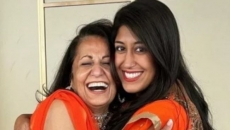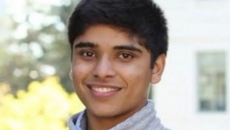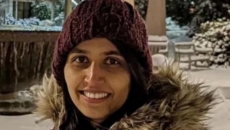It was a well-worn Canadian punchline during Donald Trump's tenure in the White House: someone should build a wall along the Canada-U.S. border. Vivek Ramaswamy says he wants to do exactly that.
"We've got to just skate to where the puck is going, not just where the puck is," the shock-and-awe Republican presidential hopeful said during Wednesday's prime-time primary debate in Miami.
"Don't just build the wall. Build both walls."
It's a riff on the anti-immigration rallying cry that helped Trump get elected in 2016, and Ramaswamy — the tech entrepreneur whose entire campaign is predicated on an amped-up, over-the-top Trump playbook — is leaning all the way in.
On Wednesday, that was his proposed solution to arresting the flow of fentanyl into the U.S., even though the numbers show the bulk of the drug is entering the country at official border crossings along the southern frontier.
So far in the 2023 fiscal year, U.S. Customs and Border Protection has seized more than 1.2 billion doses of fentanyl, but only a tiny fraction of that — about 239,000 doses — was intercepted at the northern border.
"A U.S.-Canada border wall is nothing but political sloganeering by someone who knows nothing about the actual border," said Laura Dawson, the Canadian-born executive director of the U.S.-based Future Borders Coalition.
Forty per cent of it is underwater, while the rest of it traverses some of the tallest mountain ranges on the continent in three different provinces, Dawson noted.
"No serious person would give serious consideration to building a border wall under such conditions."
There is, however, a grain of political reality at the heart of Ramaswamy's rhetoric: border security is always a hot topic for the Republican base, and some on Capitol Hill did their best last year to drag Canada into the debate.
In February, a group of House Republicans launched the Northern Border Security Caucus in an effort to escalate the pressure on Democrats and President Joe Biden over the migrant crisis at the U.S.-Mexico border.
"We're outnumbered at the northern border," caucus co-chair Rep. Mike Kelly (R-Pa.) told a hearing of the Republican-led House Judiciary Committee last week.
Kelly also cited Customs and Border Protection statistics showing that of 564 "encounters" with people named in the agency's terrorist screening database in fiscal 2023, 484 of them were at the Canada-U.S. border.
"At the southern border, you have to cross a river," Kelly said. "At the northern border, you just have to take one step. There's no line drawn. There's no fence, there's nothing. It's completely unguarded."
For her part, Dawson is no stranger to confronting superheated border-security rhetoric in Congress. She testified on the subject last spring, an appearance that led to memorable confrontations with Trump-adjacent Republican firebrands like Rep. Elise Stefanik (R-N.Y.) and Rep. Marjorie Taylor Greene (R-Ga.)
The political debate in Washington lacks the necessary expertise and understanding of the unique challenges inherent in managing a border as long and challenging as the one between the U.S. and Canada, she said Thursday.
"In some cases, this means investment in physical infrastructure and border monitoring equipment, but it also means enhanced technology and information sharing for the clearest picture of who is crossing the border and where," Dawson said.
"Understanding the correct mix of border management tools requires close collaboration with the people who live and work on the border, not a pronouncement from a podium in Miami."
There was another eyebrow-raiser Wednesday when Ramaswamy invoked a controversy involving Canada, although this one was more oblique.
He described Ukrainian President Volodomyr Zelenskyy as a "comedian in cargo pants" whose country does not deserve additional U.S. aid in its war against Russia, in part because "it has celebrated a Nazi in its ranks."
It sounded initially like he was talking about Zelenskyy himself, although a spokesperson later told NBC News it was a reference to Yaroslav Hunka, a Ukrainian Canadian and former member of an SS division who fought alongside the Nazis in the Second World War.
Hunka was present for Zelenskyy's speech to Parliament in September as a special guest of House of Commons Speaker Anthony Rota, who even described him as a "Canadian hero" — an oversight that left the federal government with a black eye and cost Rota his job.






